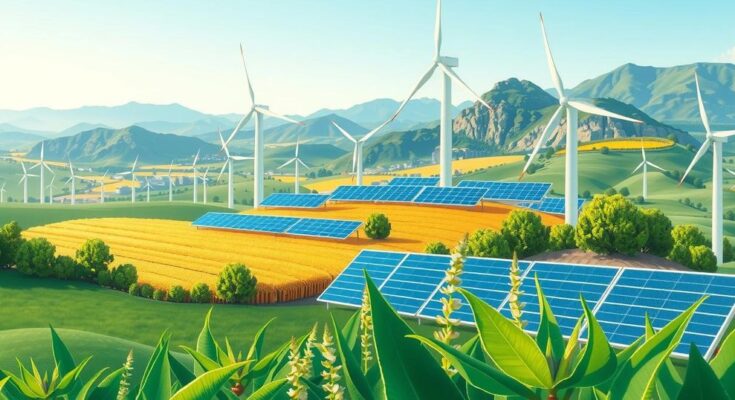Methane emissions are rapidly increasing, posing a critical challenge in achieving climate goals. Effective reduction strategies include addressing emissions from agriculture and landfills. Innovative approaches combined with international cooperation could significantly slow climate change by decreasing methane levels.
Methane emissions represent a significant challenge in efforts to limit climate change to the 2°C target established by the 2015 Paris Agreement. Methane is a potent greenhouse gas, capable of trapping heat in the atmosphere far more effectively than carbon dioxide over a shorter timescale. The reduction of methane emissions is thus crucial, as it could significantly decelerate climate warming.
Currently, approximately 600 million tonnes of methane are emitted annually, with around 40% stemming from natural sources and 60% from human activities. Fossil fuel-related leaks account for about 120-130 million tonnes of this human-generated methane. Fortunately, advancements in satellite technology have enabled better detection of these leaks, and 159 countries have committed to reducing emissions by 30% by 2030.
Conversely, agricultural methane emissions range from 210 to 250 million tonnes and pose a greater challenge to address. The nature of these emissions makes them harder to identify and manage, as they originate from small sources that collectively contribute significantly. Key contributors include manure from livestock, rice cultivation, crop waste fires, and organic material decomposing within landfills.
The United Kingdom has successfully reduced its overall methane emissions since 2000, particularly through strategies like landfill coverage and gas extraction. However, emissions resulting from agriculture have remained relatively stagnant. The role of methanogenic microbes in environments such as livestock intestines further complicates the issue, as they generate substantial methane during decomposition.
A global approach is necessary to effectively mitigate methane emissions from agricultural practices. This may involve strategies such as adopting better manure storage practices on farms, which could capture released methane for energy production. Moreover, rigorous regulations and improvements in biodigester technology could alleviate leaks and enhance efficiency.
Food systems in tropical regions often depend on livestock. However, reducing cattle populations in regions like India or Africa through better management and disease control could maintain food production levels while lowering methane emissions. Additionally, enhancing rice cultivation techniques could lead to reduced methane release while still supporting nutritional needs.
Methane emissions from landfills, particularly where food waste accumulates, can also be significantly curbed through improved landfill management. The introduction of simple measures, such as soil coverage for habitat formation and gas extraction systems, has proven effective, as demonstrated by practices in the UK.
Moreover, the prevalent practice of burning crop waste in areas such as India and tropical Africa adds both pollution and methane to the atmosphere. Learning from past successes in the UK, implementing better agricultural practices can mitigate these emissions. Thus, enhancing regulations, management strategies, and incentive programs can lead to substantial reductions in agricultural methane emissions over the next decade, particularly in high-impact regions.
In conclusion, addressing methane emissions is vital for mitigating climate change effectively. This involves recognizing the main sources of emissions, particularly from agriculture and landfills. By implementing innovative practices and fostering international cooperation, it is possible to substantially decrease methane emissions and combat climate change. The success of these measures relies on informed management, regulatory frameworks, and targeted interventions that could yield positive outcomes across affected sectors.
Original Source: theconversation.com




